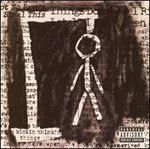|
|
 |
Dusted Reviews
Artist: The Roots Album: Game Theory Label: Def Jam Review date: Sep. 11, 2006 |

|
|
|
 |
For a group possessed of superior talent, the Roots have always been conspicuously short on hooks. This is understandable to a degree, given the fundamentally non-melodic core of the group – the master of the pocket, Questlove, and the tireless MC, Blackthought – and their background as, essentially, a hip-hop jamband. Still, it's noteworthy that the group, nearly 15 years past its first release, has never embraced the type of hook-laden songcraft that’s made superstars out of contemporaries like OutKast and Jay-Z, the latter happening to be the group’s current boss and occasional collaborator.
Instead, whenever their material edged towards conventional pop, as on “You Got Me,” perhaps their signature hit, or the jubilant (yet weirdly vulgar) Cody Chestnutt collab “The Seed,” the group reverted back to their groove-based comfort zone. They transformed “You Got Me,” an infectious radio single, into moody, showstopping explorations. Then they followed “The Seed” and the eclectic, ambitious record that housed it, Phrenology, with the low-profile, relaxed The Tipping Point. That was a good record, but, with the clean slate of a new label, and only a mid-career retrospective (2005’s Home Grown) to follow, fans had every reason to expect something more substantial from the group in 2006.
Sure enough, Game Theory turns out to be The Roots’ finest record to date. Their first release on Def Jam, the Game doesn't aim to stretch the boundaries of the genre like Phrenology, nor does it eye the charts like many Def Jam offerings. Instead, it’s the sound of a veteran group that is quietly peaking, and is comfortable if a lot of people don’t know it.
The record marries the groove-heavy, essential Roots sound of The Tipping Point with the perfectionism and craft of Phrenology, and steeps it all in the grief of personal loss and the anxiety of our seemingly apocalyptic times. Importantly, these somber themes don’t so much burden the group as galvanize and energize them, and the result is not only some of the Roots’ freshest work, but a record that stands up as a brilliantly polished and pointed comment on our times.
This success stems largely from an inspired, if stressed, Blackthought, and the group’s wise decision to collaborate primarily with longtime stalwarts like Mos Def, Dice Raw, and Malik B. Nothing if not indefatigable, Blackthought has spent the better part of his career fervently reiterating his status as “legendary,” and “hailing from the city of Philadelphia.” Here, he delves well beneath those surface-level boasts, filling his verses with personal laments, confessions, and broad meditations on societal and global ills.
Rather than celebrating the spoils of hip-hop success, ’Thought spends most of his time grappling with the difficulty of coping with the personal struggles – crime, addiction, death – that no amount of fame can alleviate, and the futility of reconciling these in a society where “it looks real fucked up for your next of kin.” Scanning the Philly, hip-hop, and national landscapes, he paints a stark picture of a nation in collective tailspin, but offers few remedies. His verses are lined with resignation – “It's crazy when you too real to be free / If you ain't got no paper then steal this CD/ Listen man, I'll let you know how it feel to be me, it don't feel right” – but his mood isn’t so much bitter as par for the course in these times. It’s hard enough just to make sense of anything these days, let alone to find solutions. What’s a thinking man to do?
Under all this, the band has crafted some of their finest tracks to date. No throwaways here, no superfluous skits or awkward cameos, and the 14 songs bleed into each other seamlessly, effectively weaving Blackthought’s subjects together into a unified, if bleak, focus. The band also orders the tracks to work its aversion to conventional hooks to its advantage: the elemental grooves work so well as the album’s template that when big hooks and fresh voices do hit, as on the razor-sharp, piano-driven “Don’t Feel Right,” they’re all the more electric.
And that combination – poignant content and inspired album-craftsmanship – is the key to the record. Thematically, it’s the Roots’ darkest effort by far. But, in the end, the live orchestration and musical chemistry that is the essence of the band is too alive, too unflappable, to cave under the emotional weight.
That is, until the final track, an 8-minute, wandering ode to J Dilla called “Can’t Stop This.” Without the vital thump-thump-PING of Questlove's drum-kit to leaven it, saturated with voice-mail eulogies, and deliberately uneven, the song closes the album on a solemn and shaky note – a lingering reminder of the group’s personal loss. It’s a deeply affecting track that sounds nothing like anything else the Roots have ever laid down, and it would be a difficult fit on any other record. But it belongs here, in part because of the significance of Dilla’s loss in the hip-hop underground, and in part because the whole album mirrors its mood. Dilla followers will surely appreciate “Can’t Stop This,” but, by the time it rolls around, Game Theory has already made its point. It’s a rich, well-crafted artistic statement that appropriates the unease of our times without sacrificing the cathartic energy that the best hip-hop delivers.
By Al Moore
|







